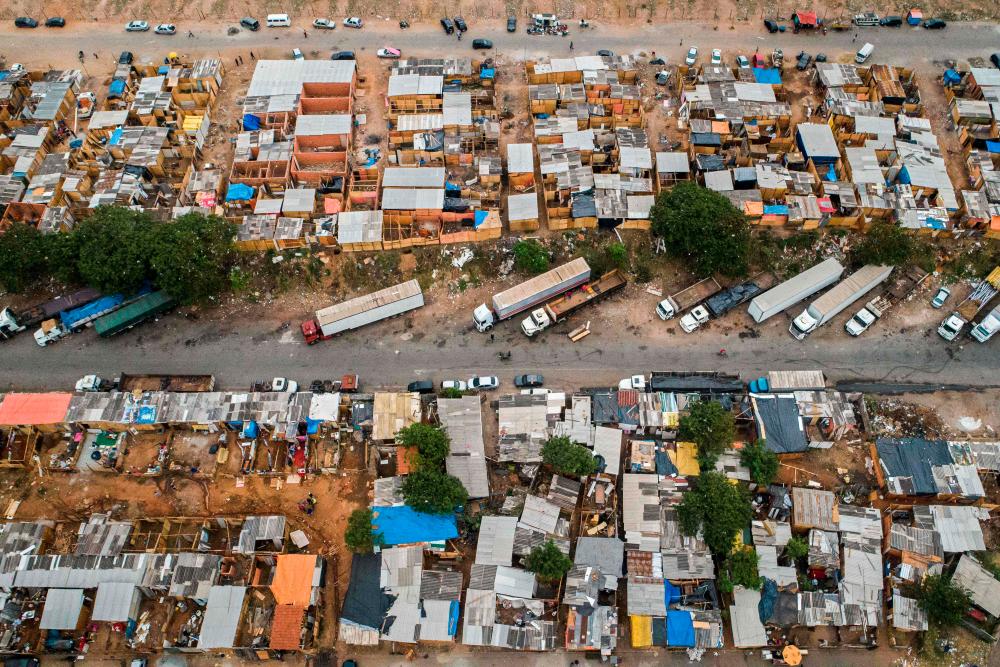SAO PAOLO: When Priscila Tomas da Silva’s husband lost his job loading trucks because of coronavirus shutdown measures in Sao Paulo, they faced a stark choice: pay the rent, or feed their six children.
So they built a shack in a new favela emerging on the city’s northern outskirts, a symbol of the devastation the pandemic is causing in Brazil.
The favela, in the Jardim Julieta neighborhood, has sprouted at an informal parking lot for semi-trucks.
About four months ago, a crush of newly homeless people began turning it into a full-blown favela, or shantytown, as the fallout of COVID-19 wreaked havoc on Brazil, the country hit second-hardest in the world by the pandemic after the United States.
Now, nearly 700 families live here. More seem to arrive all the time, carrying furniture on their heads through unpaved alleys against a backdrop of hammering and drilling -- the sound of new plywood shacks going up.
Most houses do not have bathrooms yet, and many have plastic tarps for roofs.
Conditions are crowded, hygiene a challenge and social distancing virtually non-existent, highlighting how vulnerable favelas are to the virus.
But people are trying hard to make it home.
Inside one shack, a hodgepodge of scrap lumber with beds made of wooden pallets, Da Silva, 35, held her infant son and explained how her family of eight found themselves unable to afford their rent of 500 reals (about $100) a month.
“My husband, who was the only one with a job, got fired because of the pandemic. We couldn’t pay the rent, because we have six kids to feed, too.... So we came here,“ she told AFP.
- ‘Going to kill us’ -
The pandemic is taking a heavy economic toll on the poor in Sao Paulo state, the epicenter of the outbreak in Brazil, with nearly one-fourth of the country’s 91,000 deaths.
Many people with informal jobs, such as day laborers, housekeepers and nannies -- around 40 percent of the workforce in Latin America’s biggest economy -- lost virtually all their income when quarantine measures prevented them from working.
Many countries have suspended evictions for tenants in such cases.
But in Brazil, far-right President Jair Bolsonaro vetoed similar legislation in June.
In the Jardim Julieta favela, many residents describe being left with no options.
Joyce Pinto, 27, lost her informal job at a copy shop when Sao Paulo went into lockdown, leaving her without childcare for her two-year-old daughter.
“I had to stay home with her, and we struggled to make the rent,“ she said.
“The landlord started threatening me,“ said her husband, Gilmar Chaves, 29, an unemployed day laborer.
“He was going to kill him (Chaves) and my daughter,“ Pinto said, her eyes full of fear.
So they borrowed money from her mother for plywood and built a shack.
- Slum. Eviction. Repeat -
Since the pandemic began, the newly homeless have also invaded an abandoned building in Sao Paulo’s city center.
In fact, epidemics and plagues have been forcing Brazil’s poor into favelas and other informal settlements throughout history, said Lino Teixeira, coordinator for urban policy at the Favela Observatory, a research and advocacy group.
“The creation of favelas, going back to some of the very first ones, is linked to a series of urban epidemics, from yellow fever to the Spanish flu to smallpox to measles,“ he said.
Often, the poor are then evicted again from their newly claimed land. And 2020 is no exception.
“We’ve been seeing a vicious circle where... people are forced from their homes because they can’t pay the rent, occupy land somewhere else... and soon get evicted again,“ said Talita Gonzales, a researcher at the Eviction Observatory, a housing rights group.
In Sao Paulo, South America’s biggest city, more than 2,500 families have been evicted or face the threat of eviction during the pandemic, even as officials urge everyone to stay home, according to the group.
The authorities have already served eviction notices for the Jardim Julieta favela. The deadline is August 7.
Many residents say they have nowhere else to go.
“At least here we have a roof over our heads,“ said Luciene dos Santos, 42, an unemployed hairdresser’s assistant.
“If we can’t stay, where will we go? To live under a bridge. Like so many others.” - AFP









